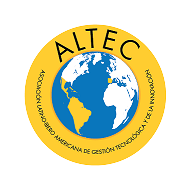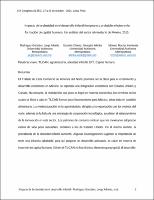| dc.contributor.author | Rodríguez González, Jorge Alberto | |
| dc.contributor.author | Guzmán Chávez, Georgina Alenka | |
| dc.contributor.author | Moreno Macías, Hortensia | |
| dc.date.accessioned | 2022-09-30T21:26:10Z | |
| dc.date.available | 2022-09-30T21:26:10Z | |
| dc.date.issued | 2021 | |
| dc.identifier.uri | https://hdl.handle.net/20.500.13048/1929 | |
| dc.description.abstract | El Tratado de Libre Comerció de América del Norte prometía ser la clave para el crecimiento y desarrollo económico en México, se esperaba una integración económica con Estados Unidos y Canadá. No obstante, la realidad fue que poco se logró en materia económica, los términos en los cuales se llevó a cabo el TLCAN fueron poco favorecedores para México, sobre todo en cuestión alimentaria. La reestructuración en la agroindustria, dirigida a la exportación con los vecinos del norte, además de la falta de una estrategia de cooperación tecnológica, ayudaron al estancamiento de la innovación en este sector. Los patrones de consumo indican que los mexicanos adoptaron estilos de vida poco saludables, similares a los de Estados Unidos. En el mismo sentido, la prevalencia de la obesidad infantil aumentó. Algunas investigaciones sugieren la importancia de tener una infancia saludable, para así asegurar un desarrollo adecuado, es clave en materia de inversión en capital humano. Si bien el TLCAN no fue el único elemento que propició el desarrollo de la obesidad infantil, parecería que sí fomentó su aceleración. Promover la inversión en procesos productivos y estilo de vida saludables pueden ayudar a hacerle frente al problema de la obesidad. | |
| dc.description.abstract | The North American Free Trade Agreement (NAFTA) promised to be the key to economic growth and development in Mexico; economic integration with the United States and Canada was expected. However, the reality was that little was achieved in economic matters, the terms under which NAFTA was carried out were not very favorable for Mexico, especially in the food sector. The restructuring of the agro-industry, aimed at exporting to Mexico's northern neighbors, in addition to the lack of a strategy for technological cooperation, contributed to the stagnation of innovation in this sector. Consumption patterns indicate that Mexicans adopted unhealthy lifestyles, similar to those of the United States. In the same vein, the prevalence of childhood obesity increased. Some research suggests the importance of having a healthy childhood, in order to ensure adequate development, is key in terms of investment in human capital. While NAFTA was not the only element that led to the development of childhood obesity, it would appear that it did foster its acceleration. Promoting investment in productive processes and healthy lifestyles can help address the obesity problem. | |
| dc.language.iso | spa | |
| dc.rights | Atribución-NoComercial-SinDerivadas 2.5 Perú | * |
| dc.rights | info:eu-repo/semantics/openAccess | es_ES |
| dc.rights.uri | http://creativecommons.org/licenses/by-nc-nd/2.5/pe/ | |
| dc.subject | TLCAN | |
| dc.subject | Agroindustria | |
| dc.subject | Obesidad infantil | |
| dc.subject | DIT | |
| dc.subject | Capital humano | |
| dc.title | Impacto de la obesidad en el desarrollo infantil temprano y probables efectos en la formación de capital humano. Un análisis del sector alimentario de México, 2015 | |
| dc.type | info:eu-repo/semantics/conferenceObject | |
| dc.relation.conferencedate | 27 - 29 de octubre, 2021 | |
| dc.relation.conferencename | XIX Congreso Latino-Iberoamericano de Gestión Tecnológica | |
| dc.relation.conferenceplace | Lima, Perú | |
| dc.contributor.corporatename | Pontificia Universidad Católica del Perú | |


